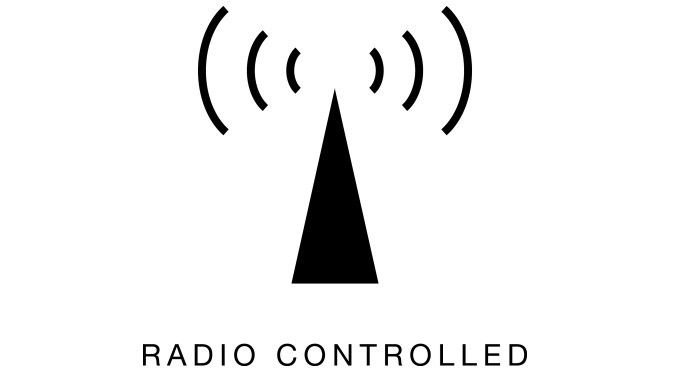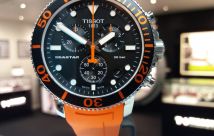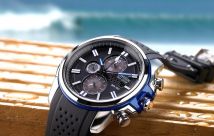Radio Controlled Problems - Watches - Clocks - Frequently asked Questions

How does the watch/clock work?
Radio controlled watches and clocks receive a time signal from a radio transmitter tuned to a caesium or 'Atomic Clock'. The atomic clock is the standard measure of time: the electron resonance frequency of the Caesium 133 atom is 9,192,631,770 cycles per second which is measured to give a time accurate to greater than +/- 1 second per million years. The transmitter signal is picked up by the watch or clock and sets the time and date automatically.
Does my watch contain any radioactive material?
No. The term "Atomic" when applied to domestic clocks and watches purely refers to the source of the time signal. The Caesium 133 Clock itself is housed under controlled conditions in a laboratory and a radio signal is transmitted which uses this clock as a referance. Domestic clocks/watches are generally refered to as either 'Radio Controlled' in the UK or 'Atomic' in America, they are both the same.
Will the switch from Rugby to Anthorn, Cumbria affect me?
The UK’s time signal is on the move after 80 years in Rugby. The time signal used to set Britain’s radio controlled clocks with extreme accuracy is on the move from Rugby, where it has been transmitted since 1927, to a new home in Anthorn in Cumbria. The signal, often referred to as ‘The time from Rugby’, will be known as ‘The Time from NPL’ from April 2007.
The time signal is accurate to within one thousandth of a second and supports a range of professional services. These include 999 communications, rail networks, cash machines and mobile phone networks. The signal is also used in homes and offices around the country. It helps synchronise servers for businesses and enables Packet-Switching, the protocol used to send and receive information across the internet.
The National Physical Laboratory is home to the nation’s atomic time and one of only five laboratories worldwide using the latest caesium fountain to contribute to the world time standard Coordinated Universal Time (UTC).The signal’s transmission is tied to NPL’s atomic clocks at Teddington in South West London.
The switch will follow a three-month test period between January and April 2007. During these periods the signal at Anthorn will be switched on for short periods of time. These are opportunities for users to ensure their equipment can receive the new signal before the old one at Rugby is switched off. Anyone wishing to test their equipment against the new signal should sign up for signal testing schedules at NPL. Managing director, Steve McQuillan, says “While most users check their time against the signal periodically, a small number of people and organisations use the signal constantly in their work. We regularly notify those we know who may be affected by our testing and we’ll be happy to add any other users to our email list if they get in touch. However, the vast majority of time signal users will not experience any disruption during the testing and switchover.”
If my watch receives the German signal will it only tell the German time?
No. All of the watches we sell are suitable for use in the UK and mainland Europe. The best way to describe this is that signal the watch receives is only a time referance to tell the watch when the hours, minutes, seconds etc. start. In order to 'tell' the watch that you are in the UK simply select to 'offset' the time by one hour, the watch will then be set to only display the time for Britain.
Where are the transmitters and how powerful are they?
There are two transmitters that cover Europe, one (MSF-60) located in Anthorn, Cumbria and one (DCF-77) located in Mainflingen, Germany. Both transmitters cover a radius of approx 1500km from the base station, this can be affected to some extent by terrain and prevailing atmospheric conditions. A further transmitter (WWVB) in Fort Collins, Colorado, serves all of the continental USA and Japans J-Ga-AS service provides further coverage. Although most watches only recieve a signal from one of the bases some multi-frequency watches and clocks are being introduced to the market.
How do I set up my new clock?
When setting up your clock for the first time or after changing a battery please ensure that a new battery is inserted with the terminals in the correct direction as shown on the case. Place the clock vertically, away from any possible source of interferance such as computers, TV's and microwaves, idealy the clock should be placed in the postition it will be in on the wall. The hands of the clock will spin and stop exactly on a given point (usually 4:00) this indicates that the clock is zeroed and ready to receive the signal. After a while the clock should recieve ths signal automatically and set itself to UK time, if this does not happen immediately try leaving the clock overnight as radio interferance is generally less during the early morning.
My Eurochron watch is showing the time 1 hour ahead/behind UK time...
The watch is currently displaying CET (Central European Time) to alter your watch to UK time simply press the left-hand resessed button with a sharp object. The watch should then show the hour as shown by the hands in 24 hour format. Press and release the button to advance the time (one hour per push) ie. if you need to remove one hour you must push the button 23 times.
My Eurochron watch has not recieved the time signal.
The battery in your watch may be too low. Ask a jeweller to check and replace the battery for you. Alternatively if the battery is full your watch may 'think' that it is too far away from the transmitter and not attempt to call for the signal. If your watch is set to the wrong time zone (AM instead of PM) this problem may occur. Press the recessed left-hand button to check the time an 24 hour format. If this is incorrect please follow the steps above.
Why doesn't my radio-controlled clock/watch set itself?
There are occasions when the transmitter is off for routine maintainance work. If your clock has worked well in the past but cannot now set itself you should check whether the batteries need changing, or whether there has been a change in its environment. Perhaps you have altered the position of the clock, or there may be a new local source of interference, such as a television or personal computer in use nearby, or a wireless burglar alarm. Try taking the clock well away from buildings and metalwork to see if it still works there. If a new clock fails to function correctly even with fresh batteries and when away from sources of interference you are advised to contact us.
Why does my radio controlled clock/watch not recieve the time signal immediately after a battery change?
Radio-controlled clocks typically check the time only every hour, or every two hours, and radio-controlled watches only perhaps three times a day. This is to conserve the battery, as the reception unit takes more power than the clock/watch mechanism. In some areas of poor reception the signal may not be obtained until the watch/clock is left overnight as radio traffic is often reduced in the early hours.
Will my watch still function abroad?
All radio controlled watches will operate as a standard Quartz accuracy watch once outside of the range of their transmitter. When moving from one time zone to another the watch will not automatically adjust and must be offset by the user.
Most radio-controlled watches are designed to revert to the previous setting (allowing for the pause) after an unsuccessful attempt to re-synchronise. This may give the impression that the attempt has been successful. Some radio-controlled watches will ignore a request to re-synchronise if they have been set to a time zone more that two hours different from that of their reference signal. The ultimate watch for receiving the correct time abroad is a Satellite Controlled watch. These watches know where they are in the world and change their time automatically as they communicate with satellites circling around the world. An example of this type of watch is the Seiko Astron watch range.
Will my DCF-77 (Frankfurt) controlled watch change between BST and GMT?
Since October 22nd 1995 there has been a permanent one-hour difference between British time (as broadcast by MSF) and Central European Time, as broadcast by DCF-77 in Germany. Since that date, the instants at which summer time starts and ends in all EU member states have been the same, governed by an EU directive. Member states of the EU are free to change their time zones, and they are free to accept or reject the use of summer time. Whilst Britain and Germany choose to continue to adopt summer time, and whilst they choose to continue using their current time zones, the year-round one-hour difference between MSF time and DCF-77 time will remain.
Why did my radio-controlled clock move to summer time at 2 a.m., one hour late?
You are correct in implying that British summer time begins at 1 a.m., this is when the times signalled by the MSF radio service and the Truetime telephone time service are altered. In fact, because the information is sent in advance, the MSF signal has already changed during the previous minute, and the Truetime signal changes during the previous second. However, only mains-powered radio-controlled clocks are likely to be continuously checking the MSF signal. Radio-controlled clocks typically check the time only every hour, or every two hours, and radio-controlled watches only perhaps three times a day. This is to conserve the battery, as the reception unit takes more power than the clock/watch mechanism. So some radio-controlled clocks or watches may not 'realise' that the time has changed until an hour or more later.
How long will a battery last in my clock/watch?
Generally, with clocks batteries will last for 12-18 months dependant on battery quality and operating temperature. For watches the battery life is approximately 18-24 months, however exessive usage of functions such as backlights and chronographs will significantly reduce this. When replacing the battery in a radio controlled clock DO NOT use Duracell batteries as they can cause malfunctioning of the clock movement.
When will the Anthorn transmitter be off the air?
The MSF signal may be taken off-air for maintenance for up to 4 hours on the first Tuesday of every January, April, July & October between 1000 UTC and 1400 UTC. Other unsheduled maintainance work may also be carried out as required. This should not affect the working of your watch or clock as the movement will simply pick the signal up again on it's next transmitter call.
Can I buy radio controlled clocks and set them to tell world times for my office?
Unfortunately not, as some countries do not use DST (Daylight Savings Time) for at least half of the year any clock rebuilt to show an offset time will be 1 hour out.





